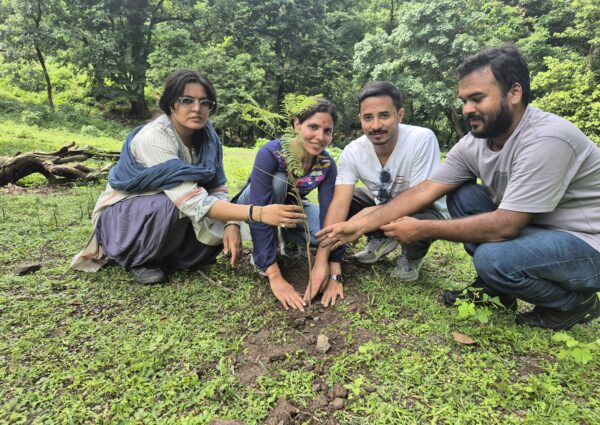Development of Training Modules and Knowledge Products
Green Pahadi Foundation (GPF) played a crucial role in developing training modules and knowledge products/compendiums for the Grameen Foundation India (GFI) under the Transform Agriculture Ecosystem in Uttar Pradesh (TRAGE UP) project. This project aimed to foster a comprehensive food systems approach, promote gender-responsive agricultural practices, and introduce women-friendly and climate-smart technologies. GPF’s contribution highlights its commitment to sustainable agriculture and community empowerment, providing consultancy services to ensure these resources are user-friendly and tailored to the specific needs of agricultural communities in Uttar Pradesh.
Vision Behind the Project
This initiative was driven by a vision to empower farmers in Uttar Pradesh with the knowledge and resources they need to adopt sustainable and gender-responsive agricultural practices, contributing to improved livelihoods, enhanced food security, and greater resilience to climate change. The project aimed to:
- Enhance Agricultural Knowledge and Skills: Provide farmers with access to practical and relevant information on sustainable agricultural practices, climate-smart technologies, and market opportunities.
- Promote Gender-Responsive Agriculture: Empower women farmers with the knowledge and resources they need to actively participate in and benefit from agricultural development.
- Improve Food Security and Nutrition: Promote the cultivation and consumption of biofortified and nutrition-rich crops to address nutritional deficiencies and improve food security.
- Build Climate Resilience: Introduce climate-smart technologies and practices to help farmers adapt to the challenges of climate change and build resilience in their agricultural systems.
Project Implementation
GPF’s consultancy services involved the creation of three distinct training modules and three comprehensive knowledge products/compendiums:
Training Modules:
- Promotion of Biofortified and Nutrition-Rich Crops: This module focused on the importance of dietary diversity and nutrition security, providing farmers with information on the benefits of biofortified crops and guidance on their cultivation. It covered topics such as:
- Nutritional Benefits of Biofortified Crops: Information on the enhanced nutritional value of biofortified crops and their contribution to improved health and well-being.
- Cultivation Practices for Biofortified Crops: Guidance on best practices for cultivating biofortified crops, including seed selection, planting techniques, nutrient management, and pest and disease control.
- Integration of Biofortified Crops into Farming Systems: Strategies for integrating biofortified crops into existing farming systems to maximize productivity and nutritional benefits.
- Women-Friendly and Climate-Smart Technologies: This module introduced sustainable farming practices and technologies that are accessible to women farmers and help them adapt to climate change. It covered topics such as:
- Water Conservation Techniques: Information on water-saving irrigation methods, rainwater harvesting, and other strategies to conserve water in agriculture.
- Soil Health Management: Practices for improving soil health and fertility, including composting, vermiculture, and the use of organic fertilizers.
- Climate-Resilient Crop Varieties: Information on crop varieties that are tolerant to drought, floods, and other climate-related stresses.
- Renewable Energy Technologies: Introduction to renewable energy technologies for agriculture, such as solar pumps and biogas digesters.
- Multilayer Farming Techniques: This module provided innovative solutions for maximizing land use efficiency and productivity through multilayer farming. It covered topics such as:
- Principles of Multilayer Farming: Explanation of the concept of multilayer farming and its benefits for maximizing land use and resource efficiency.
- Design and Implementation of Multilayer Systems: Guidance on designing and implementing multilayer farming systems, considering factors such as crop selection, spacing, and management practices.
- Benefits of Multilayer Farming: Highlighting the advantages of multilayer farming, including increased productivity, improved soil health, and enhanced biodiversity.
Accomplishments and Impact
- Empowered Farmers with Knowledge and Skills: The tailored training modules and knowledge products empowered farmers with the knowledge and skills needed to adopt sustainable and gender-responsive agricultural practices.
- Improved Food Security and Nutrition: The promotion of biofortified crops and sustainable agricultural practices contributed to enhanced food security and improved nutrition in the region.
- Enhanced Climate Resilience: The introduction of climate-smart technologies and practices helped farmers adapt to the challenges of climate change and build resilience in their agricultural systems.
- Increased Women’s Participation in Agriculture: The focus on gender-responsive agriculture and women-friendly technologies empowered women farmers and increased their participation in agricultural decision-making and economic activities.
- Sustainable Agricultural Development: The project contributed to sustainable agricultural development in Uttar Pradesh by promoting environmentally friendly and economically viable farming practices.
- Improved Livelihoods and Economic Opportunities: The project helped improve livelihoods and create economic opportunities for farmers by providing them with the tools and knowledge to increase productivity and access markets.


